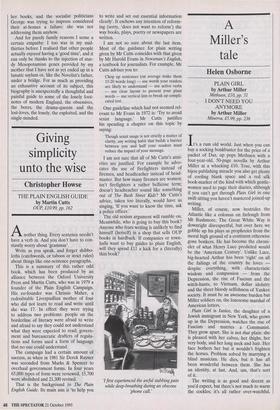Giving simplicity unto the wise
Christopher Howse
THE PLAIN ENGLISH GUIDE by Martin Cutts OUP, £10.99, pp. 162 Another thing. Every sentence needn't have a verb in. And you don't have to con- stantly worry about 'grammar'.
Write as you speak, and forget shibbo- leths (catchwords, or taboos or strict rules) about things like one-sentence paragraphs.
This is a summary of this rather odd book, which has been produced by an alliance between the Oxford University Press and Martin Cutts, who was in 1979 a founder of the Plain English Campaign. His co-founder was Chrissie Maher, a redoubtable Liverpudlian mother of four who did not learn to read and write until she was 17. In effect they were trying to address two problems: people on the borderline of literacy were afraid to write and afraid to say they could not understand what they were expected to read; govern- ment and bureaucratic drafters of regula- tions and forms used a form of language that no one could understand.
The campaign had a certain amount of success, as when in 1981 Sir Derek Rayner was seconded from Marks & Spencer to overhaul government forms. In four years 65,000 types of form were reviewed, 15,700 were abolished and 21,300 revised.
That is the background to The Plain English Guide. Its main aim is 'to help you to write and set out essential information clearly'. It eschews any intention of reform- ing (sorry, 'does not want to reform') the way books, plays, poetry or newspapers are written.
I am not so sure about the last item. Most of the guidance for plain writing given by Mr Cutts coincides with that given by Mr Harold Evans in Newsman's English, a textbook for journalists. For example, Mr Cutts advises you to:
Chop up sentences (on average make them 15-20 words long) — use words your readers are likely to understand — use active verbs — use clear layout to present your plain words — use vertical lists to break up compli- cated text.
One guideline which had not seemed rel- evant to Mr Evans in 1972 is: 'Try to avoid sexist language.' Mr Cutts justifies his spending a chapter on this topic by saying:
Though sexist usage is not strictly a matter of clarity, any writing habit that builds a barrier between you and half your readers must reduce the impact of your message.
I am not sure that all of Mr Cutts's anxi- eties are justified. For example he advo- cates the use of firefighters instead of firemen, and headteacher instead of head- master. But how many firemen are women; isn't firefighters a rather bellicose term; doesn't headteacher sound like something out of The Bash Street Kids? Mr Cutts's advice, taken too literally, would have us singing, 'If you want to know the time, ask a police officer.'
The old sexism argument will rumble on. Meanwhile, who is going to buy this book? Anyone who fears writing is unlikely to find himself (herself) in a shop that sells OUP books in hardback. If companies or town- halls want to buy guides to plain English, will they spend Di a kick for a (literally) thin book?
`I first experienced the awful stabbing pain while deep-breathing during an obscene phone call.'










































































 Previous page
Previous page